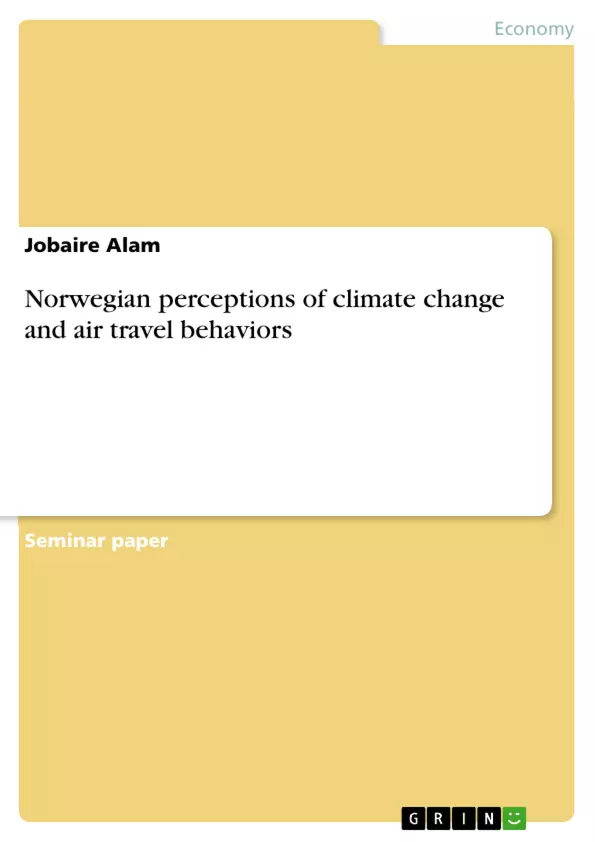The chosen topic is Norwegian perceptions of climate change and air travel behaviors, as air travel has been identified as a rapidly growing contributor to overall CO2 emissions for climate change. Specially, with long one way flight exceeding annual per capita sustainable emission levels in comparison with the other transportations for tourism, such as rail, road and sea-based passenger modes, air travel is furthermore the most harmful for the climate system.
Inhaltsverzeichnis (Table of Contents)
- Introduction and overview of the issue
- Study context or critical review of the research article
- Role-play context
- Management issues at stakeholders
- Stakeholder summary overview
Zielsetzung und Themenschwerpunkte (Objectives and Key Themes)
This paper investigates Norwegian perceptions of climate change and air travel behaviors. It aims to understand the extent to which Norwegians are aware of the environmental impacts of air travel and how this knowledge influences their travel decisions. The paper also explores potential management strategies for mitigating the negative environmental impacts of air travel.
- The environmental impact of air travel on climate change.
- Norwegian public awareness of climate change and its relationship to air travel.
- The influence of personal beliefs and values on air travel behaviors.
- The role of stakeholders in shaping and managing air travel practices.
- Potential strategies for promoting sustainable air travel practices.
Zusammenfassung der Kapitel (Chapter Summaries)
- Introduction and overview of the issue: This section provides an overview of the issue of air travel and its impact on climate change. It presents statistics on the growth of aviation and the associated increase in CO2 emissions.
- Study context or critical review of the research article: This section examines previous research on air travel, climate change, and travel behaviors. It highlights the existing knowledge gap and the need for further investigation.
- Role-play context: This section discusses the various stakeholders involved in the air travel industry, including tourists, business travelers, airlines, and government agencies. It emphasizes the importance of understanding the motivations and perspectives of these stakeholders.
- Management issues at stakeholders: This section explores the challenges and opportunities for managing air travel in a sustainable manner. It focuses on the role of government policies, industry initiatives, and consumer education.
Schlüsselwörter (Keywords)
The primary keywords and focus topics of this text are: air travel, climate change, environmental impact, sustainable travel, consumer behavior, stakeholder management, Norwegian perceptions, CO2 emissions, aviation industry.
Frequently Asked Questions
Why is air travel a major concern for climate change?
Air travel is a rapidly growing contributor to CO2 emissions, with long flights often exceeding annual sustainable emission levels per capita.
How do Norwegians perceive the environmental impact of flying?
The paper investigates Norwegian public awareness and how personal beliefs influence their decisions to fly versus using rail or sea transport.
What are the most sustainable alternatives to air travel?
Rail, road, and sea-based passenger modes are identified as less harmful to the climate system compared to aviation.
What is the role of stakeholders in managing air travel?
Stakeholders including airlines, government agencies, and tourists must balance economic interests with management strategies for sustainability.
Can personal values change air travel behaviors?
The research explores the link between environmental awareness and actual travel decisions, highlighting the complexity of changing flying habits.
- Citar trabajo
- Jobaire Alam (Autor), 2015, Norwegian perceptions of climate change and air travel behaviors, Múnich, GRIN Verlag, https://www.grin.com/document/414268



